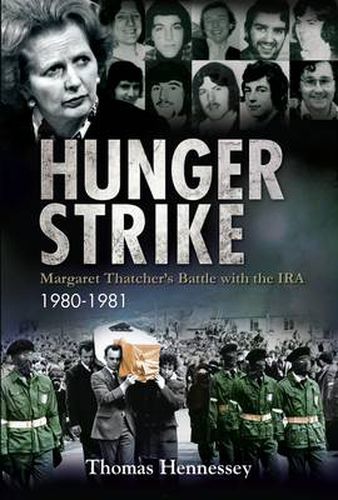Readings Newsletter
Become a Readings Member to make your shopping experience even easier.
Sign in or sign up for free!
You’re not far away from qualifying for FREE standard shipping within Australia
You’ve qualified for FREE standard shipping within Australia
The cart is loading…






Based on recently declassified British government documents, this authoritative new book by best-selling popular historian Thomas Hennessey argues that it was almost impossible for the British government to grant the demands of the Irish Republican prisoners, regardless of the impact that the hunger strikes had in boosting support for Sinn Fein. The concession of the ‘5 demands’ would have amounted to POW status for Republican prisoners and would have fatally undermined the British position that it was fighting terrorism. Controversially, Hennessey concludes that the long-term consequence for the Republican Movement was an irreversible change of strategy, effectively sowing the seeds of the end of the armed struggle as far back as 1981. In the book, Margaret Thatcher’s personal role in the hunger strikes is forensically analyzed, including her clashes with Charles Haughey and her early experience of Irish Republicanism: the assassinations of Airey Neave and Lord Mountbatten, as well as the Warrenpoint Ambush. The book also reveals: Thatcher’s authorization of the back channel between MI6 and the IRA * fierce clashes between the foreign office and the NIO over the handling of the crisis * the role of the United States and the views of Ronald Reagan and Ted Kennedy * Richard O'Rawe’s controversial assertion that there was a deal on the table to end the strike in July 1981, after the death of the Patsy O'Hara, the fourth prisoner to die. The book argues that the outcome of the hunger strike pushed the Republican Movement down the path to constitutional politics - and ultimately resulted in the end of the armed struggle. It is a unique and definitive account of one of the seminal events in modern Irish history. *** Reading Thomas Hennessey’s intense look at the stand-off between the ‘Iron Lady’ Margaret Thatcher and the equally iron will of the Irish Republican prisoners during the 1980-81 hunger strikes is like eavesdropping on a series of private (and not so private) conversations among politicians, paramilitaries, public servants, priests and parents…It makes for reading that is disturbing, frustrating and compelling in turns.
- Irish Literary Supplement, Spring 2015 [Subject: History, Politics, International Relations, Irish Studies, British Studies, criminology]
$9.00 standard shipping within Australia
FREE standard shipping within Australia for orders over $100.00
Express & International shipping calculated at checkout
Based on recently declassified British government documents, this authoritative new book by best-selling popular historian Thomas Hennessey argues that it was almost impossible for the British government to grant the demands of the Irish Republican prisoners, regardless of the impact that the hunger strikes had in boosting support for Sinn Fein. The concession of the ‘5 demands’ would have amounted to POW status for Republican prisoners and would have fatally undermined the British position that it was fighting terrorism. Controversially, Hennessey concludes that the long-term consequence for the Republican Movement was an irreversible change of strategy, effectively sowing the seeds of the end of the armed struggle as far back as 1981. In the book, Margaret Thatcher’s personal role in the hunger strikes is forensically analyzed, including her clashes with Charles Haughey and her early experience of Irish Republicanism: the assassinations of Airey Neave and Lord Mountbatten, as well as the Warrenpoint Ambush. The book also reveals: Thatcher’s authorization of the back channel between MI6 and the IRA * fierce clashes between the foreign office and the NIO over the handling of the crisis * the role of the United States and the views of Ronald Reagan and Ted Kennedy * Richard O'Rawe’s controversial assertion that there was a deal on the table to end the strike in July 1981, after the death of the Patsy O'Hara, the fourth prisoner to die. The book argues that the outcome of the hunger strike pushed the Republican Movement down the path to constitutional politics - and ultimately resulted in the end of the armed struggle. It is a unique and definitive account of one of the seminal events in modern Irish history. *** Reading Thomas Hennessey’s intense look at the stand-off between the ‘Iron Lady’ Margaret Thatcher and the equally iron will of the Irish Republican prisoners during the 1980-81 hunger strikes is like eavesdropping on a series of private (and not so private) conversations among politicians, paramilitaries, public servants, priests and parents…It makes for reading that is disturbing, frustrating and compelling in turns.
- Irish Literary Supplement, Spring 2015 [Subject: History, Politics, International Relations, Irish Studies, British Studies, criminology]